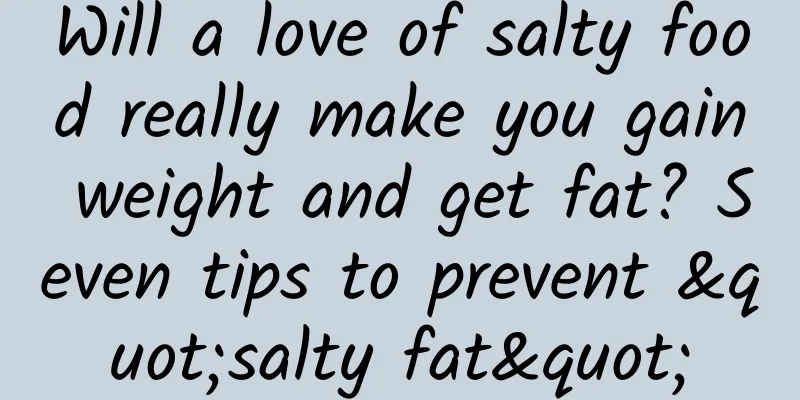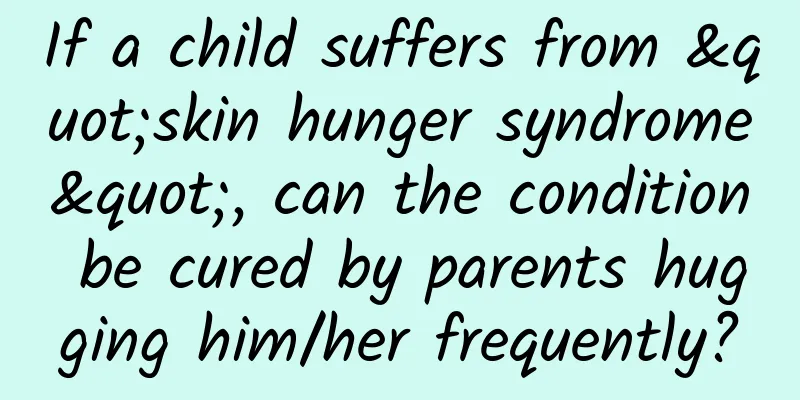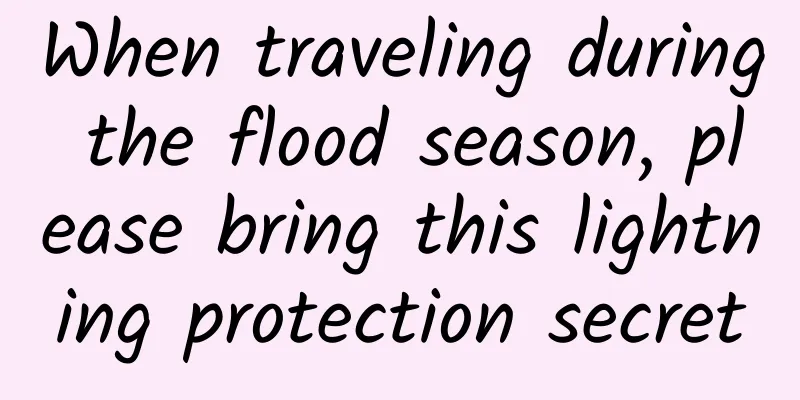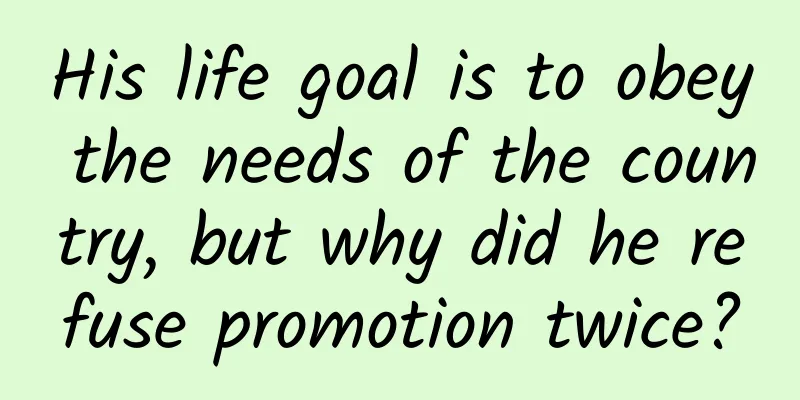Will a love of salty food really make you gain weight and get fat? Seven tips to prevent "salty fat"

|
When it comes to healthy eating and reducing oil and salt, many people think it is a cliché. There are slightly more young people who care more about reducing oil intake, because they know that cooking oil is 99.9% pure fat. Eating more oil means eating more fat and more calories, which may make you gain weight. As for eating too much salt, many people don't pay much attention to it. Eating too much salt makes people thirsty and raises blood pressure. It's fine if your blood pressure is normal. In fact, even if the calories consumed in three meals a day do not increase, eating more salt itself will increase your weight and will actually make you fat - this is really not a rumor! First, salt causes rapid weight gain through the effect of osmotic pressure. Many girls who care about their figure eat in moderation every day and pay attention to controlling the calories of their three meals. However, if they eat heavy food at a party one day, they will gain two or three pounds the next day, and they will feel bloated and not refreshed. This is because salt (sodium chloride) attracts water molecules super strongly whenever it is dissolved in water. When there is more salt in the blood, the blood osmotic pressure will increase, which will attract water from the tissues into the blood vessels. This will promote high blood pressure on the one hand, and cause tissue dehydration on the other hand, causing the skin and mucous membranes to lose moisture. Then the body will feel thirsty and want to drink water. However, the water you drink is not as easy to excrete as before, because the water is "bound" by salt, and the kidneys excrete salt very slowly. Therefore, in one or two days or even several days, excess water will accumulate in the body, causing mild edema. Therefore, after the salt content in the body increases, the increase in water will lead to weight gain. For people who don’t eat too much salt on a daily basis, if they eat more salt the night before, their weight will increase significantly the next day, and the effect can be seen on the scale. Of course, this kind of weight gain from eating too much salt is reversible in the short term. If you eat too much in one day, you can return to normal by eating less salty food in the next two or three days. Some weight loss methods that only eat vegetables and fruits use the method of "not eating salt" to reduce the salt content in your body, so more water is excreted. Although it only takes a few days and the body fat is not reduced much, people appear to be several pounds lighter. Secondly, experiments in humans and animals have found that a long-term high-salt diet does promote obesity. Epidemiological surveys have repeatedly found that there is an inexplicable link between eating salty foods and gaining weight, and it is not just as simple as increasing water intake. However, the underlying mechanism is still unclear. A research report published in 2018 (Lanaspa MA, PNAS, 2018) used mouse experiments to explore the mechanism by which salty food promotes obesity. Researchers have found in animal experiments that high salt promotes the metabolic pathway of aldehyde reductase-fructose kinase, increases endogenous fructose production in the liver and hypothalamus, enhances appetite, and promotes obesity, fatty liver and insulin resistance. If the gene of the endogenous fructose synthesis pathway is knocked out, mice will not easily gain weight when eating a high-salt diet. **In a sense, eating more salt and drinking more sweet drinks have some common physiological mechanisms for promoting weight gain. **It's just that people already know that drinking more sweet drinks can promote weight gain, but many people don't know that eating more salt can promote weight gain. Although this article is only a mechanism study conducted in animals, epidemiological surveys have repeatedly found that people who eat more salt have a higher risk of obesity, fatty liver and metabolic syndrome than those who eat less salt. It is speculated that this mechanism of eating more salt and gaining weight may also exist in humans. Some people may argue here: My grandfather also eats a lot of salty food, so why isn’t he fat? Yes, 50 years ago, working people ate salty food without getting fat. Some people are genetically hard to get fat, so that's not to mention. Life was hard back then, people ate less and worked harder, so there wasn't enough calories to store fat, so that's not to mention. From the perspective of salt consumption alone, there are still many reasons. First, their physical labor intensity is too high. Physical labor will cause sweating, and sweating will excrete a lot of salt. Nowadays, people sit in air-conditioned rooms and have too little physical activity. They don’t even have the opportunity to sweat a little bit a day, so eating a little more salt is considered excessive. Secondly, people's lives were hard in the past, and although the food was salty, they usually had more rice than food, so the total amount of salt was limited. Now the food may not seem so salty, but there is less rice and more food, so the amount of salt consumed is more. Besides, the current sources of sodium salt in daily life are far more than just dishes. For example, salty potato chips, rice crusts, puffed foods, soda crackers, snacks such as beef jerky, spicy strips, strange-flavored beans, and plums, as well as various melon seeds, peanuts, and roasted nuts... Which one is not a high-sodium content? Whether it is instant noodles, dried noodles, ramen, udon noodles, or dumpling wrappers or wonton wrappers, most of them contain a lot of sodium chloride and sodium carbonate. Even baked goods such as bread, snacks, and date cakes require the addition of a small amount of sodium chloride or sodium bicarbonate. In the past, people lived in poverty and could not afford snacks. They only had cakes during the New Year and other festivals, and there were not so many sources of sodium in their food. Third, foods high in salt and sodium tend to stimulate appetite, and people tend to eat more. Will food really taste good just by adding a lot of salt? I'm afraid it will have to be accompanied by a lot of oil to increase the flavor, which will increase the fat content of the food and increase the calorie value. In many cases, you have to add MSG, chicken essence and meat flavoring. (For information about excessive MSG promoting weight gain, please see the related article posted earlier: Nutrition News: Will MSG make you fat?) These ingredients that enhance flavor and flavor are good for stimulating appetite, at least in the short term. Strong-flavored foods are often seasoned with sugar, because cooking with sugar can not only promote the Maillard reaction and increase the aroma, but also make the salty taste "rich and mellow" and not so salty. However, sugar is also a source of calories. The aroma produced by the Maillard reaction can also strongly stimulate appetite. Only when these methods are used will diners feel that the taste of strong-flavored dishes is particularly "enjoyable". Especially for those restaurants whose ingredients are of low quality, they may use such strong flavors to cover up the problem of low cost and low quality of raw materials. But the "heavy taste" prepared in this way is high in calories, sugar, salt and MSG, which increases your appetite and makes you unable to stop eating. It would be strange if it doesn't make you fat... Therefore, it is not surprising that people who eat heavy food for a long time are more likely to gain weight when compared with people with the same genetic inheritance and the same level of physical activity. So, facing the cruel fact that heavy food can make you fat, what should we do? How can we live in harmony with all kinds of salty food? Here are some salt control suggestions: 1 Apart from dishes, try not to eat other salty foods. - Get rid of salty snacks first, or eat as little as possible. Only eat sodium-rich snacks occasionally when the meal is very light. ——Try to reduce the intake of salty staple foods. ——Try not to drink salty soups. Replace them with plain water, tea, black coffee, lemonade, barley tea, rice soup, etc. If you can achieve the above three points and use the limited salt quota as much as possible to enjoy dishes, you will have reduced the salt intake by at least one third. 2 Use light-flavored foods to match strong-flavored foods and control the total amount. ——When eating out or having a family dinner, use light dishes to match strong-flavored dishes. For example, if there is a Beijing-style shredded pork with soy sauce that is already very salty (sweet and salty dishes usually contain more salt than non-sweet dishes), use a non-salty large mixed vegetable to match it. ——If you want to eat salty sauces, pickles, pickled mustard greens, mustard tubers, etc., use original dishes without salt. For example, if your family likes to eat mushroom sauce or chili sauce as a side dish, then make a dish of braised green leaves in water and oil without adding salt, and let them dip the sauce themselves to avoid over-saltiness. - When eating meat, try not to choose sausages and ham. Because they are very salty and have much more sodium than the stewed meat at home. If you must eat it, pair it with lettuce without salt or salad dressing. 3 Use umami, fragrance and sourness to reduce saltiness. ——If you think the food is tasteless without enough salt, add more vinegar, pepper, Sichuan pepper powder, and chili powder to make it taste better. Nutritionists are against strong flavors, which does not include vinegar and various spices, but only excessive oil, salt, and sugar. - If you want to add umami seasonings, add them first, and then reduce the amount of salt by half, or only add one-third. You will find that with the help of MSG and chicken essence, the dishes with less salt are also delicious. 4 When buying food, look carefully at the sodium content data and choose those with lower sodium. The nutritional information on food packaging shows the sodium content. Remember that 1000 mg of sodium equals 2.5 g of salt, which is not very difficult to calculate. Even if you don't want to calculate, you can just compare the data. If you find a product with the highest sodium content, don't choose it. 5. Reduce the amount of salty seasoning. When eating hot pot, don't use too much dipping sauce. Whether you are eating instant noodles, mixing salad, or mixing clay pot rice, use only half or even one-third of the seasoning. 6 After eating too much salty food, give yourself a break with a light-flavored meal. If you have a big salty meal occasionally, you should give your tongue and kidneys a break in the second meal, or even the second and third day, by eating light food with less salt to give it a rest. Especially for breakfast, you can eat foods without salt. Don't eat heavy meals continuously, so that the body has a chance to eliminate excess sodium in time, so as not to cause increased fat synthesis. 7 Exercise regularly to sweat and reduce salt intake. I don't need to explain this one. As long as you follow these few rules, you can live in harmony with heavy food. Eating a satisfying dish occasionally is also one of the pleasures of life. It helps you live a healthy life and prevent obesity. You don't have to eat boiled cabbage every day, which is as bitter as eating it in plain water... Related Literature: Miguel A. Lanaspa, Masanari Kuwabara, Ana Andres-Hernando, et al. High salt intake causes leptin resistance and obesity in mice by stimulating endogenous fructose production and metabolism. PNAS March 20, 2018 115 (12) 3138-3143; first published March 5, 2018; doi: https://doi.org/10.1073/pnas.1713837115 |
<<: Full of useful tips on home fire prevention: This is what a fire extinguisher looks like!
>>: Are "cold fireworks" fireworks? How dangerous are they?
Recommend
Top Growth Hackers: How to Use Data Experimentation to Build a Growth Engine
Growth hackers are the real source of revenue for...
Teacher Zhu Chenbin's 2019 Liu Yao Example Lecture 10 episodes recording with hexagram example documents Baidu Cloud
Teacher Zhu Chenbin's 2019 Liu Yao Example Le...
From self-service to shared laundry, isn’t it painful?
The "sharing economy" is blowing, where...
Without bicycles, we can't even take a plane!
June 3rd of each year is World Bicycle Day. The b...
National Bureau of Statistics: Energy production in May 2021
In May , industrial raw coal production above des...
WeChat dedicated input method is here
According to the latest news, WeChat input method...
In-depth|What does OpenAI really want?
【Editor's Note】At the end of last year, OpenA...
A map tells you where to see the most beautiful volcanic lake in China
Loading long image... Source: National Geographic...
Can fish in the water hear people talking on the shore?
When looking for a fishing spot, we always recomm...
A step-by-step guide to spam filtering with Python and Scikit-Learn
[[197427]] Text mining (getting information from ...
Weibo promotion skills, what are the Weibo promotion methods?
1. Understand all Weibo traffic entrances to help...
If cats have "universal fingerprints", is your phone still safe?
Since the iPhone 5s introduced fingerprint recogn...
Five people were killed while charging electric vehicles indoors in a community in Tongzhou! How to prevent accidents before they happen?
A fire in a residential area in Tongzhou, Beijing...
With a history of more than 2,000 years of cultivation, this tree can produce "liquid gold", which helps my country's edible oil production capacity
Camellia oleifera is a woody edible oil tree spec...
WeChat teaches you how to set up a street stall: This score is your signboard
It seemed as if overnight, setting up stalls beca...









